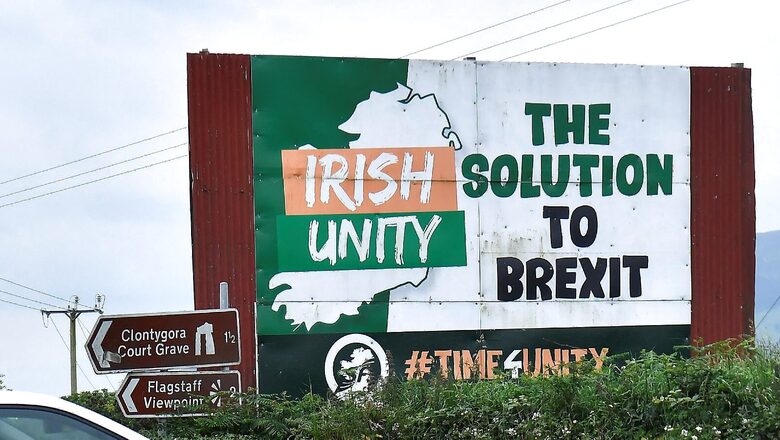
views
UK foreign minister James Cleverly will travel to Belfast to meet political parties of Northern Ireland to discuss the Northern Ireland Protocol which has caused tensions in the region following its inception in 2021.
Cleverly’s visit coincided with the UK and the EU agreeing to share data on trade between Northern Ireland and England, Scotland and Wales. The protocol asks for customs checks on goods heading to Northern Ireland from Great Britain to ensure they do not enter the European single market via member state Ireland.
However, the pro-UK Democratic Unionist Party (DUP) has left Northern Ireland without a power-sharing government due to its opposition to the deal, endangering the backbone of the 1998 peace deal which ended decades of sectarian violence.
What Does the Protocol Entail?
It is a trading agreement which was negotiated during Brexit talks. This allows goods to be transported across the Irish land border into Northern Ireland without any further need for checks.
Essentially, the protocol ensures that the land border between Northern Ireland — which is part of the UK, and the Republic of Ireland, which is an EU member state — continues to be invisible and respects the Good Friday Agreement.
This was easier before Brexit because transporting goods across the border was easy since both sides followed rules mandated by the EU. New rules were needed because Northern Ireland has a land border with the Republic of Ireland, which is an EU member state and Great Britain is not.
The EU follows strict rules with respect to food and requires border checks when goods like milk and eggs arrive from non-EU nations.
The BBC in a report said that the land border remains a sensitive issue because Belfast suffered from sectarian violence for more than half a century. The DUP fears that the cameras and border posts could lead to instability and threaten the Good Friday Agreement.
The UK and EU agree that the Good Friday Agreement aka the Northern Ireland peace deal must be protected at all costs. These two were signatories of the Northern Ireland Protocol as part of Brexit agreements and this is now part of the international law.
How Does the Protocol Work and What Does UK Want?
The protocol ensures that inspections and document checks will be done between Great Britain (England, Scotland and Wales) and Northern Ireland but at Northern Ireland’s ports and not at the Irish border.
The protocol also outlined that Northern Ireland would continue to follow EU rules on product standards.
However, the UK wants to create red and green lanes for goods imported from Great Britain into Northern Ireland.
Green lanes would provide entry to trusted traders transporting goods to Northern Ireland only and will be exempted from checks and customs controls.
The red lanes would be for products entering the Republic of Ireland and the rest of the EU and would have to undergo full checks and customs controls. Different taxation rules would be applied.
Businesses in Northern Ireland currently follow EU rules on state aid and VAT and EU limits are applied to government payments to help firms and tax breaks.
The UK wants these limits removed and wants an independent body to settle disputes over NI Protocol instead of the European Court of Justice.
The DUP opposes the protocol because it is a unionist party which supports Northern Ireland being part of the UK and points out that placing an effective border across the Irish Sea undermines Northern Ireland’s place within the UK.
It said that it will not take part in Northern Ireland’s power-sharing government unless its concerns are resolved.
Sinn Fein, a nationalist party, accepted the protocol and emerged the largest winner in May 2022 elections. But it needs the DUP to form a government.
The European Commission, unhappy with the UK, took legal action against it and urged the UK government to return to the table for discussions. The EU said it will not renegotiate the protocol but will work on how rules apply.
The EU said it will reduce customs and checks on goods, lower the amount of paperwork and relax rules so that items like chilled meats can be sent across the Irish Sea.
The EU now has access to the UK’s IT systems for detailed information about goods flowing from Great Britain to Northern Ireland following the data sharing agreement but technical negotiations still continue.
(with inputs from the BBC and EuroNews)
Read all the Latest Explainers here




















Comments
0 comment